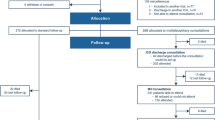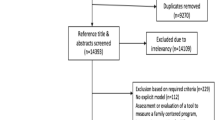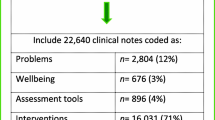Abstract
Background
Patients with dementia (PwD) are a vulnerable group and caring for these patients in acute care hospitals is challenging. Structural conditions and standardized treatment procedures in hospitals often do not correspond to the needs of this patient group. Physicians may not be well prepared for caring for PwD.
Objective
This study aimed to ascertain physicians’ experiences and attitudes in caring for PwD or cognitive disorders and their subjective workload. This describes physicians’ estimation of the share of the overall workload resulting from caring for PwD on the ward. Furthermore, we identified factors that are most likely to contribute to the workload.
Material and methods
An online survey was conducted using a self-developed standardized questionnaire with 29 questions based on a systematic literature review. The questionnaire was pretested in several steps and finally sent out via e‑mail to 610 physicians in 9 hospitals in northern Germany. Aspects surveyed were: physicians’ confidence in caring for PwD and resulting workload, challenges in caring for PwD, collaboration with relatives and other professionals and educational needs. Important influencing factors were determined by multiple linear regression analyses.
Results
A total of 192 hospital physicians completed the questionnaire (response rate 32%). According to respondents the proportion of PwD in acute care hospitals increased significantly during the last 3 years. Only one third of respondents reported feeling confident in caring for PwD and 65% stated that they do not feel confident in caring for PwD especially in situations of nutrition in cases of food refusal and distinguishing between delirium and dementia. The strongest influencing factors were increased efforts in terms of time and support needs, complex medical situations, difficult collaboration with relatives and lack of patient compliance. A successful collaboration with other professionals was associated with increased confidence in caring for PwD. Legal and ethical aspects as well as drug therapies were mentioned as desirable topics for educational programs.
Conclusion
A relevant number of hospital physicians feel insecure and burdened in caring for PwD. The study provides important information for the design of educational programs and for potential changes in structural and procedural aspects. The results may be used as starting points for improving hospital care for PwD.
Zusammenfassung
Hintergrund
Patienten mit Demenz (PmD) im Krankenhaus sind eine besonders vulnerable Patientengruppe und stellen für die Versorgung in Akutkrankenhäusern eine besondere Herausforderung dar. Strukturelle Bedingungen und standardisierte Behandlungsabläufe entsprechen nur unzureichend den Bedürfnissen dieser Patienten. Ärzte sind nicht gut auf deren Versorgung vorbereitet.
Ziel der Arbeit
Ziel dieser Studie waren die Erfassung der Erfahrungen und Einstellungen von Ärzten im Umgang mit PmD und der damit einhergehenden subjektiven Arbeitsbelastung (geschätzter Anteil der Gesamtarbeitsbelastung, die sich aus der Betreuung von PmD ergibt), sowie die Bestimmung von Faktoren, die zur Arbeitsbelastung beitragen.
Material und Methoden
Eine Onlinebefragung wurde mit einem selbst entwickelten, standardisierten Fragebogen mit 29 Fragen auf Grundlage einer systematischen Literaturrecherche durchgeführt. Der Fragebogen wurde in mehreren Schritten vorgetestet und per E‑Mail an 610 Ärzte in 9 Krankenhäusern in Norddeutschland versandt. Die befragten Aspekte waren: Sicherheit von Ärzten im Umgang mit PmD und daraus resultierende Arbeitsbelastungen, Herausforderungen im Umgang mit PmD, Zusammenarbeit mit Angehörigen und anderen Berufsgruppen sowie Fortbildungsinteresse. Wichtige Einflussfaktoren wurden mithilfe linearer Regressionsanalysen bestimmt.
Ergebnisse
Insgesamt 192 Krankenhausärzte (32 %) füllten den Fragebogen aus. Nach Schätzungen der Befragten hat sich der Anteil an PmD in Akutkrankenhäusern in den letzten 3 Jahren deutlich erhöht. Nur ein Drittel der Befragten berichtete, sich im Umgang mit PmD sicher zu fühlen. 65 % gaben an, dass sie sich im Umgang mit PmD nicht sicher fühlen, insbesondere in Bezug auf die Ernährung bei Nahrungsverweigerung oder hinsichtllich der Unterscheidung zwischen Demenz und Delir. Die Arbeitsbelastung wurde als hoch eingeschätzt. Hoher Zeit- und Betreuungsaufwand, schwierige Anamneseerhebung, erschwerte Zusammenarbeit mit anderen Berufsgruppen und mangelnde Compliance des Patienten wurden als stärkste Einflussfaktoren angegeben. Eine gute Zusammenarbeit mit anderen Berufsgruppen war mit einer größeren Sicherheit im Umgang assoziiert. Rechtliche und ethische Aspekte sowie medikamentöse Therapien wurden als wünschenswerte Themen für Fortbildungen genannt.
Schlussfolgerungen
Ein relevanter Anteil der Krankenhausärzte fühlten sich unsicher und belastet im Umgang mit PmD. Die Studie liefert wichtige Informationen für die Gestaltung von Fortbildungsangeboten sowie für mögliche Änderungen auf Struktur- und Prozessebene vor. Die Ergebnisse können ein Ausgangspunkt für die Verbesserung der Krankenhausversorgung von PmD sein.




Similar content being viewed by others
Abbreviations
- DemTect:
-
Dementia detection test
- IQR:
-
Interquartile range
- MMSE:
-
Mini mental status examination
- PwD:
-
People/patients with dementia
- SD:
-
Standard deviation
- TFDD:
-
Test for early detection of dementia with depression demarcation
References
Arolt V, Driessen M, Dilling H (1997) Psychische Stoerungen bei Patienten im Allgemeinkrankenhaus. Dtsch Ärztebl 94:A1354–A1358
Balzer K, Schroeder R, Junghans A, Stahl U, Traeder JM, Koepke S (2016) Improving competencies in evidence-based dementia care: Results from a pilot study on a novel inter-professional learning programme (the KOMPIDEM project). GMS J Med Educ 33(2):Doc 35. https://doi.org/10.3205/zma001034
Balzer K, Junghans A, Brinkmeier K, Jacobs B, Koepke S (2013) Nursing care of patients with dementia in the acute hospital. Turning barriers into chances. Pflege Z 66:204–207
Bremer Landesinitiative Demenz (LinDe) (2012) Demenzkranke im Krankenhaus – Versorgung von Menschen mit Demenz im Akutkrankenhaus – Ergebnisse einer Befragung von Beschaeftigten der Krankenhaeuser im Land Bremen
Cairns R, Evans J, Prince M (2004) The impact of NICE guidelines on the diagnosis and treatment of Alzheimer’s disease among general medical hospital inpatients. Int J Geriatr Psychiatry 19:800–802
Deutsche Gesellschaft fuer Psychiatrie Psychotherapie und Nervenheilkunde, Deutsche Gesellschaft fuer Neurologie (2015) S3-Leitlinie „Demenzen“ (Langversion – 1. Revision, August 2015). https://www.dgppn.de/fileadmin/user_upload/_medien/download/pdf/kurzversion-leitlinien/REV_S3-leiltlinie-demenzen.pdf. Accessed 01.07.2017
DiAG, dip (2012) Menschen mit Demenz im Krankenhaus. Eine Handreichung der interdisziplinaeren Arbeitsgruppe der Dioezesan-Arbeitsgemeinschaft der katholischen Krankenhaeuser (DiAG) in der Erzdioezese Koeln. Deutsches Insitut fuer angewandte Pflegeforschung (dip), Köln
Ehlenbach WJ, Hough CL, Crane PK, Haneuse SJ, Carson SS, Curtis JR, Larson EB (2010) Association between acute care and critical illness hospitalization and cognitive function in older adults. JAMA 303:763–770. https://doi.org/10.1001/jama.2010.167
Erkinjuntti T, Wikstrom J, Palo J, Autio L (1986) Dementia among medical inpatients. Evaluation of 2000 consecutive admissions. Arch Intern Med 146:1923–1926
Fick DM, Agostini JV, Inouye SK (2002) Delirium superimposed on dementia: a systematic review. J Am Geriatr Soc 50:1723–1732
Griffiths A, Knight A, Harwood R, Gladman JR (2014) Preparation to care for confused older patients in general hospitals: a study of UK health professionals. Age Ageing 43(4):521. https://doi.org/10.1093/ageing/aft171
Harwood RH (2012) Dementia for hospital physicians. Clin Med 12:35–39
Schade (Helm) L (2017) Patienten mit Demenz im Akutkrankenhaus – Erfahrungen und Einstellungen behandelnder AerztInnen – eine Querschnittsstudie in Schleswig-Holstein. Zentrale Hochschulbibliothek Lübeck, Lübeck
Kennelly SP, Morley D, Coughlan T, Collins R, Rochford M, O’Neill D (2013) Knowledge, skills and attitudes of doctors towards assessing cognition in older patients in the emergency department. Postgrad Med J 89:137–141. https://doi.org/10.1136/postgradmedj-2012-131226
Krueger C, Meyer G, Hamers J (2010) Physical restraints in hospital. A systematic overview. Z Gerontol Geriatr 43:291–296. https://doi.org/10.1007/s00391-010-0111-z
Lindsay J, Rockwood K, Rolfson D (2009) Die Epidemiologie des Delirs. In: Lindsay J, Donald MA, Rockwood K (eds) Akute Verwirrtheit – Delir im Alter. Huber, Bern, pp 71–107
Martinez-Lage P, Frolich L, Knox S, Berthet K (2010) Assessing physician attitudes and perceptions of Alzheimer’s disease across Europe. J Nutr Health Aging 14:537–544
Pinkert C, Holle B (2012) People with dementia in acute hospitals. Literature review of prevalence and reasons for hospital admission. Z Gerontol Geriatr 45:728–734. https://doi.org/10.1007/s00391-012-0319-1
Ruesing D, Herder K, Mueller-Hergl C, Riesner C (2008) Umgang mit Menschen mit Demenz in der (teil)stationaeren, ambulanten und Akutversorgung. Pflege Ges 13:306–321
Schutz D, Fusgen I (2013) Care situation for hospitalized patients with cognitive disorders. Z Gerontol Geriatr 46:203–207. https://doi.org/10.1007/s00391-013-0482-z
Teodorczuk A, Mukaetova-Ladinska E, Corbett S, Welfare M (2014) Learning about the patient: an innovative interprofessional dementia and delirium education programme. Clin Teach 11:497–502. https://doi.org/10.1111/tct.12203
Trauschke T, Werner H, Gerlinger T (2009) Diagnostic procedures and frequency of dementia. A prospective study in the daily routine of a geriatric hospital (PAOLA study). Z Gerontol Geriatr 42:385–390. https://doi.org/10.1007/s00391-009-0043-7
Welz-Barth A, Stella S, Fuesgen I (2007) Haeufigkeit kognitiver Stoerungen in der geriatrischen Rehabilitation. Phys Med Rehabil Kurort 17:94–97
White N, Leurent B, Lord K, Scott S, Jones L, Sampson EL (2016) The management of behavioural and psychological symptoms of dementia in the acute general medical hospital: a longitudinal cohort study. Int J Geriatr Psychiatry. https://doi.org/10.1002/gps.4463
Willis GB, Artino AR (2013) What do our respondents think we’re asking? Using cognitive interviewing to improve medical education surveys. J Grad Med Educ 5:353–356. https://doi.org/10.4300/JGME-D-13-00154.1
Young J, Crome P, Anderson D, Barker A, Brooker D, Husk J, Orrell M, Thompson R, Woolley R, Hood C, Gndesha A, Souza R (2011) Report of the national audit of dementia care in general hospitals 2011
Acknowledgements
We thank all physicians for participating in the study.
Funding
No external funding was used.
Author information
Authors and Affiliations
Corresponding author
Ethics declarations
Conflict of interest
L. Helm, K. Balzer, A. Behncke, N. Eisemann and S. Köpke declare that they have no competing interests.
The study protocol was positively assessed by the Ethical Committee of the University of Lübeck (Ref-No. 13-237). Informed consent was provided by all study participants.
Additional information
Availability of data and materials: Data collected and used for this study are available on request for non-commercial research and validation purposes from the corresponding author of this study.
Author contributions: L. Helm conceived the study, performed the data retrieval and analysis and drafted the manuscript with a major contribution from S. Köpke. K. Balzer participated in the design of the study and writing the manuscript. N. Eisemann supervised the statistical analysis and A. Behncke the data analysis. All authors read and approved the final manuscript.
Rights and permissions
About this article
Cite this article
Helm, L., Balzer, K., Behncke, A. et al. Patients with dementia in acute care hospitals. Z Gerontol Geriat 51, 501–508 (2018). https://doi.org/10.1007/s00391-017-1349-5
Received:
Revised:
Accepted:
Published:
Issue Date:
DOI: https://doi.org/10.1007/s00391-017-1349-5




